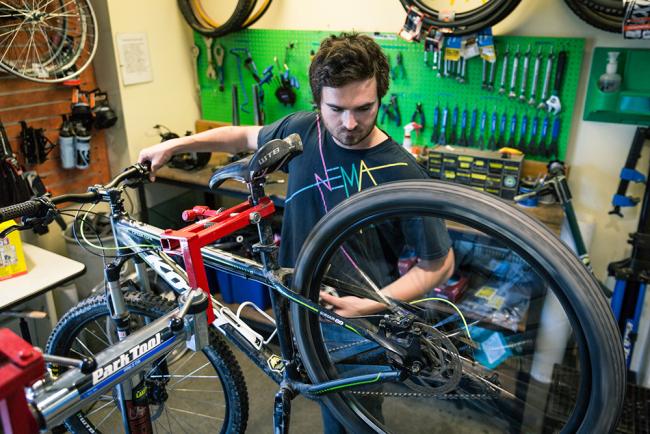More Bicycling Resources
WWU Cycling Team
The WWU Cycling Team is a competitive club sport supporting and funding road cyclists to participate in the collegiate race season from March to May. Western’s team is not solely for experienced racers. One of their major focuses is the encouragement and development of cyclists at ALL levels, from commuters to top-level athletes. There are categories in each race that support entry level athletes to compete with cyclists of similar paces and abilities. They are also proud to be active members in a community that continues to give us so much, and we are lucky to call Bellingham our home.
Visit the WWU Cycling Team website and Instagram, @wwucyclingteam, for more information.
Buying a Bicycle
Purchasing a bike is exciting and it can be overwhelming. Thinking about how you and where you are going to ride your bike will help you narrow down your choices. If you want a bike to ride to campus and around town, we recommend getting a "commuter" bike. Having fenders and a bike rack with bike bags on your commuter bike will make it more comfortable and functional for every day riding. Other styles of bikes include road, mountain, gravel, single speed, etc.
It is important to purchase a bike that fits your body. Technicians at a bike shop can help you determine what size bike frame fits you best. Once you have the correct frame size the handle bars and seat can be adjusted or changed to fit you better. Your bicycle should be comfortable to ride and not hurt your body.
We recommend that when you purchase your bike, you also purchase a bike helmet (if you don't have one), a bike mirror (super helpful for seeing what is going on behind you) and bike gloves (give you better grip on your handle bars and protect your palms if you crash your bike).
Tips for Purchasing a Used Bike
Stores in Bellingham with used bikes.
- The Hub Community Bike Shop is a local non-profit organization that refurbishes used bikes and sells them at an affordable price.
- Jack’s Bicycle Center and Earl's Bike Shop sell new and used bikes.
Second-hand marketplaces such as Craigslist, OfferUp, and Facebook Marketplace are a good place to find used bikes. It is possible to find a great bike for commuting for less than $300.
Here are some tips for buying a bike from someone online:
- Confirm that the Bike Isn't Stolen: Check the serial number on www.bikeindex.com and www.project529.com to make sure the bike is not stolen.
- Ask Questions and Communicate with the Seller: Asking questions can help you learn more about the bike and the seller. Ask about the condition of the bike and what accessories come with it, and try to get a feel for the seller. If you think the bike is priced too high, ask if the seller is flexible on price. Agreeing on a price beforehand can make the purchase easier. Of course, if you see the bike and it is not as advertised, the price should be flexible.
- Always Meet in a Public Place: Look for somewhere that is well-travelled with open space, such as the the parking lots at REI or Barkley Village or at the Safe Exchange location in front of the Bellingham Police Department.
- Bring a Friend
- Inspect the Bike: First, make sure there is air enough air in the tires for a test ride. They should not sag when you sit on the bike. Check that the bike feels and looks safe to ride. Then, take it for a ride! Shift through all the gears, ride up a hill, and test the brakes If the bike was advertised as working well and it is not, then ask for a discount or do not buy the bike.
- Trust Your Instincts: Go with your gut! If the seller doesn’t want to meet you in a place that is safe, won’t give details on the bike, or if something seems too good to be true, look for a different bike.
What to do With Unwanted Bikes
If you own a bike that you no longer want, please don't abandon it on campus. Here are some options for finding your bike a new home.
- The Hub Community Bike Shop accepts some donations of bikes and bike parts. Check their website to see what donations they are taking or contact them to see if they will take your specific bike.
- Sell your bike through Craigslist, OfferUp, Facebook Marketplace, or other online second-hand marketplace.
- Donate your bike to another organization. Habitat for Humanity, Goodwill, and Value Village typically take bikes for donation. Before donating, double check that they are accepting bicycles.
Bicycle Advocacy
Bicycle advocacy is important for letting city decision makers know that citzens want safe and well-functioning bike infrastructure. If you’ ae looking to connect with other riders or get involved, check out these resources:
- The Associated Students Transportation Advisory Committee works towards managing the Active Transportation Fee Fund and implementing ongoing transportation projects and programming on campus.
- Locally, Walk & Roll Bellingham works towards creating safe, comfortable, equitable, and healthy streets for people who walk and roll (ride bikes, scooters, and skateboards, use strollers, move by wheelchairs etc.).
- Washington Bikes is a state-wide organization that works towards increasing investment in bike infrastructure, providing tools for advocates, and educating the public on the health, safety, and economic benefits of cycling.
- The League of American Bicyclists works to create safer roads, stronger communities, and a Bicycle Friendly America through education and advocacy. They certify communities, universities, and companies as being bike friendly and challenge everyone to create a world more welcoming to people on bikes.

